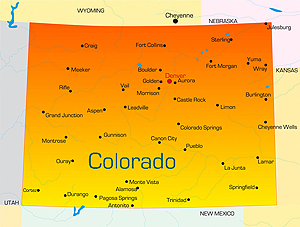A portal website bringing together vital information about natural gas and natural gas vehicles.
 | Owners of natural gas and propane vehicles are required to purchase an annual tax decal from the Colorado Department of Revenue or a decal vendor. As an "early adopter" with an AFV tax credit, and fuel tax exemption laws passed in 2000, Colorado has had a fairly active legislative NGV roster over the years. State legislatures extended the AFV tax credit from 2000 that would have expired in 2005 through 2009, and then again extended modified AFV tax credits through 2015. The state also has passed legislation that incorporates AFVs into State fleets.
|
| Category | January (Jan.) 1, 2010, to Jan. 1, 2012 | Jan. 1, 2012, to Jan. 1, 2013 | Jan. 1, 2013, to Jan. 1, 2014 | Jan. 1, 2014, to Jan. 1, 2015 | Jan. 1, 2015, to Jan. 1, 2016 |
| 1 - Vehicle meeting Tier 2, Bin 1 federal emissions standards | 85% | 75% | 75% | 75% | 75% |
| 2 - Light-duty diesel-electric hybrid passenger vehicle with a minimum fuel economy of 70 miles per gallon (mpg) | 65% | 45% | 25% | 15% | 15% |
| 3 - Light-duty passenger vehicle, light-duty truck, or medium-duty diesel-electric truck conversion that increases original fuel economy by at least 40%; or a new diesel-electric or gasoline-electric hybrid medium-duty truck with 30% greater fuel economy than a comparable vehicle | 75% | 55% | 35% | 25% | 25% |
| 4 - Light-duty passenger vehicle, light-duty truck, or medium-duty truck natural gas or liquefied petroleum gas (propane) conversions | 75% | 55% | 35% | 25% | 25% |
| 5 - Idle reduction technologies | 25% | 25% | 25% | 25% | 25% |
| 6 - Vehicle meeting Tier 2, Bin 2 or 3 federal emissions standards, with a fuel economy of at least 40 mpg | 75% | 10% | 10% | 0% | 0% |
| Legislative Session Dates: | January 8 - May 7 |
| Legislature Website: | http://leg.colorado.gov/ |
This state was last examined and updated in December, 2016.
